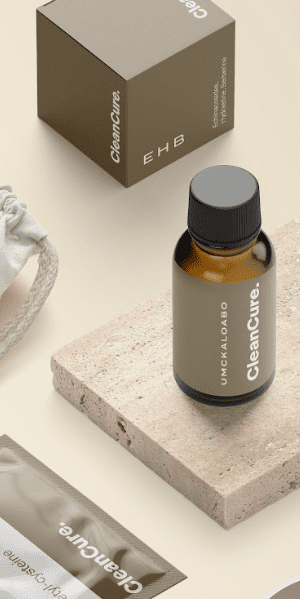
Image Source: RDNE Stock Project // holistic functional medicine
If you’ve ever wondered about improving your health in a more natural and comprehensive way, you might have come across the term “holistic functional medicine.”
Holistic functional medicine is a comprehensive and patient-centered approach to healthcare that combines the principles of holistic medicine and functional medicine. It takes into consideration the interconnectedness of various aspects of an individual’s health – including physical, mental, emotional, and environmental factors – to promote overall well-being and address the root causes of health issues.
It might sound like a mouthful, but don’t worry – we at CleanCure, an online naturopathic urgent care, are here to break it down for you in simple terms.
What is holistic functional medicine?
Holistic functional medicine, a type of holistic care, is a unique approach to healthcare that focuses on treating the whole person rather than just the symptoms of a specific condition. It combines the principles of both holistic and functional medicine to provide a comprehensive and individualized approach to health and wellness.
Holistic medicine takes into account the physical, mental, emotional, and spiritual aspects of a person, while functional medicine looks for the root causes of health issues and aims to restore balance and optimize bodily functions.
Holistic functional medicine is an integrative approach combining holistic and functional medicine combined that allows practitioners to develop personalized treatment plans that address the underlying factors contributing to a person’s health concerns.
From chronic conditions and pain management to overall well-being, holistic functional medicine offers a natural and alternative approach to traditional medicine. As you consider the entire body and focus on prevention, this model of medicine empowers individuals to take charge of their own health and achieve optimal well-being through a combination of natural therapies and lifestyle changes.
Holistic And Functional Medicine Combined
Now that we know what is holistic functional medicine, let’s take a look at what holistic medicine and functional medicine is and what they cover to give you an idea on what holistic functional medicine encompasses.
Holistic Medicine
Holistic functional medicine is a comprehensive approach to health and well-being that considers the whole person – mind, body, and spirit – in the context of their environment. Unlike conventional medicine, which often focuses on treating symptoms and individual parts of the body, holistic functional medicine takes into account the interconnection between these factors and their impact on overall health.
In holistic functional medicine, the goal is to treat the root cause of health issues rather than just alleviating symptoms. Practitioners recognize that the body is a complex system, and by addressing the underlying imbalances or dysfunctions, they aim to restore optimal health and promote wellness.
This approach to medicine acknowledges that our mental and emotional state, as well as our physical health, play significant roles in our overall well-being. Holistic functional medicine also takes into consideration the impact of our environment, such as our diet, lifestyle, and stress levels, on our health.
Types of Holistic Treatments
In holistic functional medicine, there are various types of holistic treatment options available to address physical, mental, spiritual, and emotional well-being. These therapies aim to treat the person as a whole, promoting overall wellness and healing. Let’s explore some of these holistic treatment options:
Acupuncture

Image Source: Ryutaru Tsukata // holistic functional medicine
Acupuncture is a practice commonly used in holistic functional medicine to promote balance and harmony in the body. It involves the insertion of thin needles into specific points on the body to stimulate energy flow and restore equilibrium. This ancient Chinese medicine therapy has been used for centuries to treat a wide range of health conditions.
The benefits of acupuncture in holistic health are numerous. It can help alleviate pain, reduce stress, improve sleep, and enhance overall well-being. Acupuncture can also support the body’s natural healing processes and boost the immune system, such as having acupuncture treatment when you have a sinus infection.
There are different types of acupuncture techniques used in holistic functional medicine. Traditional Chinese acupuncture, for example, focuses on balancing the flow of energy called Qi (pronounced “chee”) through meridians in the body. Another technique is auricular acupuncture, which involves stimulating specific points on the ear to address various health issues.
Chiropractic Care

Image Source: Yan Krukao // holistic functional medicine
Chiropractors use a range of techniques to promote the body’s natural healing ability. One of the main techniques is spinal adjustments, where the chiropractor gently manipulates your spine to correct any misalignments. They can help restore proper nerve function, reduce pain, and improve your overall well-being.
Chiropractic medicine can be beneficial for a variety of health issues. It can help with muscular tension, chronic pain, and range of motion problems, as well as common conditions.
Massage Therapy

Image Source: Andrea Piacquadio // holistic functional medicine
In the field of holistic functional medicine, there are various types of massage therapy options available. Each type can address specific health issues and contribute to your overall well-being.
1. Medical massage: This type of massage is specifically tailored to treat and manage medical conditions. It focuses on addressing muscular tension, improving circulation, and reducing pain associated with chronic illnesses or injuries.
2. Oncology massage: Oncology massage is designed to provide comfort and relaxation for individuals undergoing cancer treatment. It helps manage symptoms such as pain, anxiety, fatigue, and nausea. Oncology massage can enhance the overall quality of life for cancer patients.
3. Sports massage: Sports massage is commonly used by athletes to enhance performance, prevent injuries, and aid in recovery. It targets specific muscle groups used during physical activity, reducing muscular tension and improving flexibility.
4. Prenatal massage: Prenatal massage is a safe and supportive therapy for pregnant women. It helps alleviate common discomforts such as back pain, swelling, and joint stiffness. Prenatal massage also promotes relaxation and reduces stress in expectant mothers.
5. Geriatric massage: Geriatric massage is designed to address the unique needs and conditions of older adults. It helps improve circulation, flexibility, and mobility. Geriatric massage also offers emotional support and promotes relaxation for seniors.
6. Neuromuscular therapy: Neuromuscular therapy focuses on addressing muscular pain and dysfunction caused by nerve compression or chronic muscle tension. This therapy targets trigger points to relieve pain and restore proper muscle function.
7. Craniosacral therapy: Craniosacral therapy is a gentle technique that focuses on the subtle movements of the craniosacral system (the membranes and cerebrospinal fluid surrounding the brain and spinal cord). It is believed to promote healing and improve the functioning of the central nervous system.
8. Swedish massage: Swedish massage is a popular type of massage known for its relaxation benefits. It involves long, flowing strokes, kneading, and circular movements to improve circulation, relieve muscle tension, and promote relaxation.
9. Myofascial release: Myofascial release targets the fascia, a connective tissue that surrounds and supports muscles and organs. It helps release tension and restrictions in the fascia, leading to increased mobility, pain relief, and improved overall function.
Each of these types of massage therapy offers unique benefits and can be tailored to address specific health issues such as muscular tension, chronic pain, circulation problems, and stress.
Physiotherapy

Image Source: Pxfuel // holistic functional medicine
One of the therapies commonly used in holistic functional medicine is physiotherapy. Physiotherapy is a type of treatment that focuses on improving your body’s movement and function. It can be used to manage and treat a wide range of health issues, including muscular tension, range of motion and flexibility problems, chronic pain, circulation problems, and even stress.
Physiotherapy uses various techniques such as exercises, stretches, and manual therapy to help you regain and maintain optimal physical function. This can help reduce pain and improve your body’s overall mobility. It can also help increase blood circulation, which is important for promoting healing and reducing inflammation.
Physiotherapy can also be effective in managing chronic pain and preventing further injuries. Through targeted exercises and stretches, your physiotherapist can help you improve your strength and flexibility, thereby reducing the risk of future pain or injury.
The therapeutic exercises and techniques used in physiotherapy can help relax both the human body and mind, leading to reduced stress levels and a better sense of well-being.
Nutrition Counseling
Nutrition counseling focuses on making dietary changes and adopting healthy eating habits to optimize well-being. It involves personalized guidance to address specific health concerns and promote optimal nutrition, commonly provided by health coaches and nutritionists.
Functional Medicine
Functional medicine falls under the umbrella of holistic medicine, and rather than being a battle of functional medicine vs holistic medicine, it’s more of a harmonious blend.
The core focus of functional medicine is to deliver patient-centered care that pinpoints and resolves imbalances and dysfunctions within the body. Functional medicine doctors collaborate with their patients to craft customized treatment strategies, which encompass lifestyle adjustments and dietary modifications to rectify imbalances within the body.
Principles of Functional Medicine
Functional medicine rests upon these seven defining principles:
Patient-Centered Care: Patient-centered care is the cornerstone of functional medicine, placing the individual at the heart of their health journey. In this approach, the patient’s unique needs, preferences, and experiences guide every aspect of care. Unlike traditional medical models where doctors may focus solely on treating specific symptoms, functional medicine practitioners take the time to truly listen to the patient’s story. They delve into not only the physical symptoms but also the emotional, social, and environmental factors that contribute to a person’s well-being.
Body-Wide Connections: Rather than viewing organs and systems in isolation, functional medicine acknowledges that the body functions as a complex and interconnected network. A change or imbalance in one area can have ripple effects throughout the entire system. For instance, an issue with digestion might influence the immune system, affecting overall health. This holistic approach prompts functional medicine practitioners to consider the big picture when diagnosing and treating health concerns.
Dynamic Gene-Environment Interaction: Functional medicine takes into account the dynamic dance between our genetic makeup and the environment we live in. While genes play a significant role in our health, they are not static entities. They interact with our surroundings, including lifestyle, diet, stress levels, and exposure to toxins. Functional medicine recognizes that our genes can be turned on or off by these external factors, influencing our health outcomes. This understanding allows practitioners to explore how environmental factors may contribute to imbalances or disease processes.
Personalized Care: One of the defining features of alternative functional medicine is its commitment to personalized care. Each person’s body is unique, and what works for one individual may not work for another. Functional medicine practitioners delve into a patient’s detailed medical history, genetics, lifestyle, and preferences to craft customized treatment plans. This tailored approach allows for interventions that precisely address the underlying causes of health issues, rather than merely alleviating symptoms.
Promotion of Healthy Lifestyles: Functional medicine goes beyond simply treating illness; it seeks to cultivate a foundation of vibrant health and well-being. The focus is not just on managing symptoms, but on empowering individuals to make choices that enhance their quality of life. This includes advocating for healthy lifestyle practices such as balanced nutrition, regular exercise, stress management, and adequate sleep.
Functional Vs Holistic Medicine
When it comes to healthcare, there are many different approaches. Two of these approaches, functional medicine and holistic medicine, have gained popularity in recent years. While they may sound similar, there are some key differences between holistic vs functional medicine.
Functional medicine is all about getting to the root causes of illness. Rather than just treating symptoms, functional medicine practitioners work to uncover the underlying imbalances or dysfunctions that contribute to a person’s health issues. They take into account factors such as genetics, lifestyle, and environmental influences. This personalized approach allows them to develop individual therapies that address those specific root causes.
On the other hand, holistic medicine takes a broader perspective. It sees health issues as a result of imbalances in the whole person – mind, body, and spirit. Holistic medicine often emphasizes natural interventions and alternative therapies, such as herbal remedies and acupuncture, and can sometimes reject the conventional practices of Western medicine.
Frequently Asked Questions
What is a holistic functional doctor?
A holistic functional doctor is a healthcare practitioner who specializes in holistic functional medicine. They are trained to take a comprehensive view of your health, considering not only your physical well-being but also your mental and emotional health.
Holistic functional doctors use a wide range of treatment approaches, both conventional and alternative, to create personalized treatment plans that address the root causes of your health issues. They aim to restore balance and promote overall health and well-being.
Is holistic functional medicine considered alternative medicine?
Holistic functional medicine is often considered an alternative to conventional medicine because it takes a different approach to healthcare. While conventional medicine focuses on managing symptoms, holistic functional medicine aims to address the underlying root causes of health issues. It also incorporates a wider range of treatment approaches, including both conventional and alternative therapies.
Holistic functional medicine can work alongside conventional medicine, and many practitioners take an integrative approach, combining the best of both worlds for optimal health outcomes.
What is the difference between holistic and naturopathic medicine?
Holistic medicine takes a comprehensive approach to healthcare by considering the mind, body, and spirit as interconnected. It emphasizes treating the whole person rather than just the symptoms. Holistic medicine practitioners may use a variety of treatment modalities, such as nutritional interventions, acupuncture, chiropractic adjustments, and stress reduction techniques, to address imbalances and promote healing.
On the other hand, naturopathic medicine also emphasizes overall health and well-being, but it focuses specifically on using natural remedies and therapies. Naturopathic doctors often use treatments such as herbal medicine, dietary supplements, homeopathy, and lifestyle modifications to support the body’s natural healing abilities. They aim to work with the body’s inherent healing mechanisms.
What is the difference between integrative medicine and functional medicine?
While both approaches share the same health goals, integrative medicine focuses more on symptom relief and addressing the underlying cause, while functional medicine takes a deeper dive into all the factors that can impact a person’s well-being.
Integrative medicine therapies are focused on symptom relief while addressing the underlying cause of an illness. It combines conventional and alternative therapies to provide a holistic treatment plan. The goal is to promote optimal health and well-being by taking into consideration the physical, mental, emotional, and spiritual aspects of a person. Integrative medicine aims to address the root cause of the illness, rather than just alleviating the symptoms.
On the other hand, functional medicine takes a broader view of a person’s health. It looks at the full range of factors that can influence well-being, including genetics, lifestyle choices, environmental factors, and emotional health. Functional medicine practitioners aim to identify and address imbalances in the body’s systems, such as hormone levels, gut health, and nutrient deficiencies, in order to restore and optimize overall health.
Combine Holistic Functional Medicine With Naturopathic Treatment
If you’re looking for a holistic functional medicine doctor, you’re probably interested in a more comprehensive and natural approach to your health. Combine this with naturopathic treatment from online urgent care like CleanCure. We offer fast, clean relief for your medical condition — all with doctor’s access throughout your treatment.
Or, you may explore different holistic medicine clinics in Portland, Oregon, to choose which type of naturopathic care resonates with you the most.











